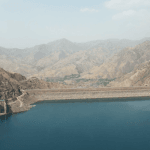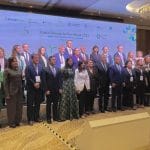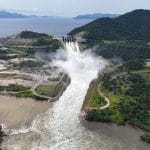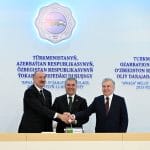On 3 May, EU Energy Commissioner Günther Oettinger and Ukraine’s Energy and Coal Industry Minister Eduard Stavytsky led a two-day international high-level roundtable to modernise Ukraine’s gas transport system (GTS). But Russian gas monopoly Gazprom was notably absent.
The roundtable included ministers from several EU member states, European gas companies, and European financial institutions. The US Ambassador also attended the roundtable as well as energy major Chevron.
From the Russian side, a counsellor and the first secretary of the mission to the EU participated, Oettinger’s spokeswoman Marlene Holzner told New Europe on 3 May. “The Commission continues to offer engaging in talks on a trilateral consortium, if all three parties – EU companies, Ukraine and Russia – are interested,” Holzner added.
“At the end of this process, it must be a win-win-win effect because Russia was, is, and will be the most relevant gas exporter to the European market,” Oettinger told a press conference with Stavytsky, stating the European Commission’s hope that the modernisation of Ukraine’s GTS would be undertaken by a trilateral consortium that would include Gazprom.
On the question whether the consortium will be bilateral or trilateral, Stavytsky said that in the near future an ad hoc scientific group will release a feasibility study analysing the financial aspects. “Then we will address this issue with all our counterparts and stakeholders and then all the stakeholders from the European Union and from the Russian Federation will have a possibility to look into this issue,” he said.
Stavytsky said that the Ukrainian government hopes for a transparent discussion and an approach “on equal footing”.
Ukraine is trying to consider its geopolitical situation and to establish a real gas hub, he said. “Right now it would be premature to say if it would be bilateral, trilateral or any other form of consortium,” he said.
However, Russia’s interest in upgrading Ukraine’s GTS has been lukewarm at best. Russia has proposed the construction of huge volumes of new pipeline capacity from Russia to Europe bypassing Ukraine, London's Centre for Global Energy Studies (CGES) analyst Julian Lee told New Europe on 3 May. “The big risk for both the EU and Ukraine is that they invest billions of Euros in modernising Ukraine’s gas transport system, which then remains grossly under-utilised,” he said.
Lee noted that Gazprom’s unwillingness to participate in the meeting in Brussels suggests that it has little interest in playing a role in developing Ukraine’s gas infrastructure in partnership with the EU. “It appears that Gazprom still wants to have control over the Ukrainian infrastructure and this will hamper any long-term solution to the problem of gas transit across Ukraine,” he said.
That could be the reason Gazprom gave EU and Ukraine the cold shoulder on 3 May. But Stavytsky put up a brave face, saying that EU-Ukraine energy co-operation will not be undermined by Moscow. “I would like to believe and I’m actually sure that our Russian counterparts will be respectful regarding the decisions we have been making. As far as giving us the cold shoulder, well, we have a real hard and hot heart so we will try to melt their ice,” he said.







